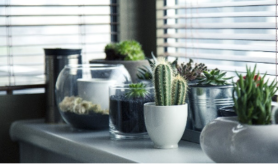Seminar Blogs
Guest blog: “From the ground to the sky: watering the plant that is your story” – Aneta Brašničková
“Knowledge in Making – Design by Doing” is the title of the Transmission in Motion seminar series. Its second session, moderated by Liesbeth Groot Nibbelink, “Plant-based Dramaturgy”, took place on November 18, 2020. This session’s guest was a Chilean theatre director, scriptwriter and musician, Manuela Infante and she discussed the process of creating Estado Vegetal and the plant-based logics behind the dramaturgy of the performance.
Peculiar question that accompanied the session was: what is plant-like in the human? One could answer quite simply. Both humans and plants need the same things: water, sun and fresh air. Humans are basically house plants, just with more complex emotions. Let me ask you, what kind of plant exactly do you think of when you think of a plant? Now, think about the reason behind this plant.
I think of the Christmas cactus, or Schlumbergera, that is on my desk. I wouldn’t say that I am a Christmas spirited person, yet I still choose this plant. The reason why is that this particular plant was given to me by my mother last Christmas. I didn’t know it then but this plant was probably the one that started my obsession with house plants. I always wanted to be that person who has a lot of plants but I was too afraid I’m simply unable to take care of them. And maybe because this one was a gift from my mother, or maybe because I was feeling quite lonely around that time, I was determined to keep this one alive. Not long after that I felt my Christmas cactus needed a friend. A friend who was not me because everyone needs to have a little variety in their lives. And that is how, almost a year later, I found myself with fifteen plants in my room. It would be good to note as well, that my obsession branched into other rooms of the house and now my father has to change the water of my avocados whenever I’m not at home for a longer period of time.

My obsession with plants started as a small seed that, with time, grew and spread, and now is branching into different directions. Just like the Christmas cactus on my desk. But you probably thought of a completely different kind of plant. And your choice can be accompanied by questions that could be used in dramaturgical thinking as well. Why did you think of that particular plant? What is the story behind it? Each plant has different needs that you need to fulfil if you want it to flourish and survive. Similarly to Elinor Fuchs’ article EF’s Visit to a Small Planet, where you’re invited to imagine your project as a planet, imagine it as a plant. Determine what kind of plant it is in order to understand its needs. Once you think about this, you’ll know what to do in order for your plant to grow, branch out and flourish.
 A friend told me recently about something he read somewhere. It was about house plants and how they remove oxygen at night, so having a lot of house plants in your room could be dangerous. I didn’t believe him, knowing that plants also produce oxygen during the day, but it made me think of a book by Boris Vian called L’Écume des Jours that I read some time ago. In this book, a waterlily grows on a girl’s lung and this beautiful and strange disease is slowly killing her. As one life grows another wilts. When you’re working on something, on your plant, in order for it to grow you also need to let some things go.
A friend told me recently about something he read somewhere. It was about house plants and how they remove oxygen at night, so having a lot of house plants in your room could be dangerous. I didn’t believe him, knowing that plants also produce oxygen during the day, but it made me think of a book by Boris Vian called L’Écume des Jours that I read some time ago. In this book, a waterlily grows on a girl’s lung and this beautiful and strange disease is slowly killing her. As one life grows another wilts. When you’re working on something, on your plant, in order for it to grow you also need to let some things go.
The plant is rooted deep in the ground, its branches slowly reaching for the sky, creating this connection, or a bridge in between. The power of connection doesn’t stay just there. Plants connect people too, whether it is by swapping fairs, herbariums, or art inspired by plants. An example of this is also a Czech podcast I enjoy called Phytophilia, where the owners of a Prague based flower shop interview various plant enthusiasts about their work and life dedicated to plants. So, what connection is your plant going to create?
References
- Fuchs, Elinor. 2004. “EF’s Visit to a Small Planet”. Theater 34 (2): 5-9. Duke University Press.
- GoOut. Phytophilia (podcast). https://open.spotify.com/show/2cpT0eAMp7FMfDZOFfygfS?si=UB6iztyiTT-DDAd2sACs4Q
- Transmission in Motion. “Plant-based Dramaturgy”. Online, November 18, 2020.
- Vian, Boris. 1947. L’Écume des Jours. Paris: J.-J. Pauvert.

